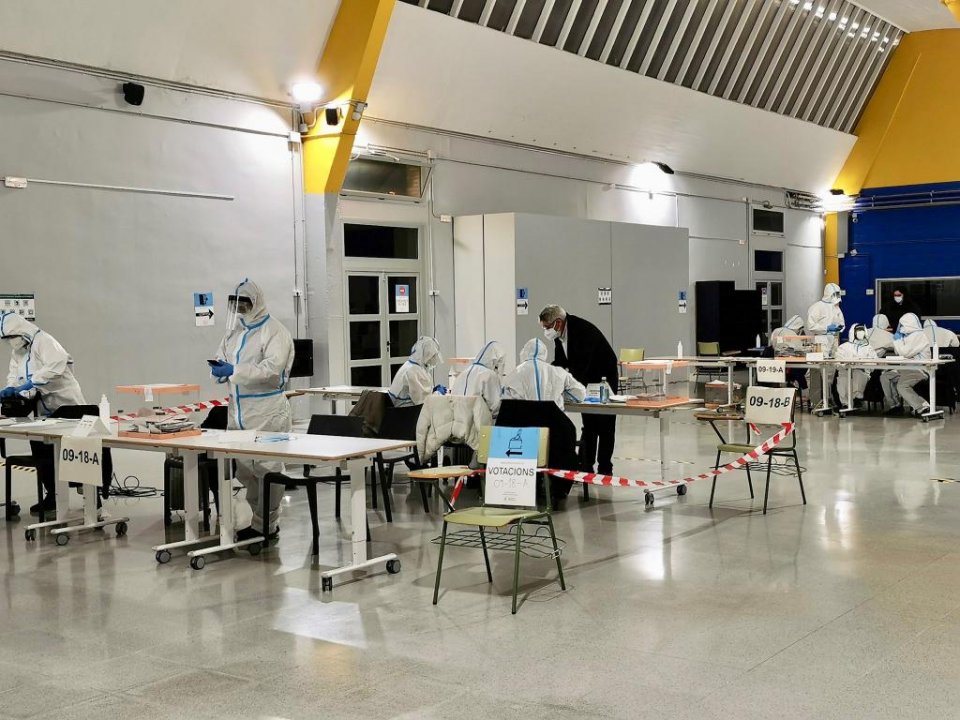Latest: Coronavirus in Spain figures (1 Mar)
ALSO READ: Spain starts the second phase of its three-phase Vaccination Strategy
Please support Spain in English with a donation.
Click here to get your business activity or services listed on our DIRECTORY
Report below updated in Spain at 18.45h on Mon 15 Feb
CORONAVIRUS in SPAIN – latest Health Ministry figures
The latest official figure* released by the Spanish Health Ministry on Monday 15 February for the number of people who have tested positive for Coronavirus since the start of the pandemic is now 3,086,286. This is an overall increase of 30,251 against the figure released on Friday – now a third consecutive drop in the rate of increase in weekend figures. Last Monday the figure had been 47,095 for the weekend, and the previous weekend had been 79,686. The figure on Monday 25 January had been 93,822 – the highest weekend figure since the start of the pandemic.
The ministry claims that 1,876 of these infections have occurred in the past 24 hours. The peak of recorded infections for a 24-hour period during this ‘third wave’ of the pandemic in Spain was on 21 January, when 18,504 cases were registered. During the ‘first wave’, it was on 31 March when 9,222 cases were registered.
Friday had seen an overall increase of 14,581 cases against Thursday, but with the ministry claiming that 5,566 had occurred in a 24-hour period. Thursday had seen an overall increase of 17,853 over Wednesday, yet 7,181 in 24 hours.
The overall accumulated incidence rate for Spain has now dropped to 416,91 per 100,000 inhabitants for the past 14 days. On Friday it was 496 and last Monday was 667. It is over 500 in Castilla y León (508), Madrid (559) and the Valencia region (505) – as well as in the autonomous city of Melilla (616).
There have now been 196,059 cases of Coronavirus detected in the past 14 days – out of the total 3,086,286. The figure for the past 7 days is 68,616.
There are currently 21,030 people requiring hospital treatment for Covid-19 in Spain, of which 4,128 are in intensive care. This represents 37.95% occupation of intensive care units (ICUs) by Covid-19 patients. It is 55% in La Rioja.
The official figure* for the total number of Coronavirus-related deaths on Monday 15 February is now 65,449 – an increase of 702 since Friday. The figure last Monday had been 909 deaths during the weekend. It is now a total of 1,230 deaths in the past 7 days.
The highest increase of deaths for a 24-hour period during this ‘third wave’ in Spain was on 9 February when 766 were registered. The peak of deaths during the ‘second wave’ was on 24 November when 537 were registered. During the ‘first wave’ it was on 2 April when 950 were registered.
Vaccinations given
Latest figures (up to 15 Feb) show that Spain has now received 2,914,755 doses of Covid-19 vaccines (from Pfizer-BioNTech, Moderna and AstraZeneca), and that 2,561,608 jabs have been administered. This is 87.9% of total vaccines received. 1,070,091 people have now received a second jab. In a separate report, we have published the amount of vaccines received and administered for each region in Spain. Latest: Covid-19 Vaccinations in Spain
Increase in infections per region
Of the 1,876 new infections claimed by the Health Ministry to have only been registered in the past 24 hours on Monday 15 February, the numbers per region are as follows:
- 363 in the Basque Country (last 24 hour increase was 552)
- 243 in Madrid (1,933)
- 195 in Andalusia (478)
- 186 in Castilla y León (573)
- 166 in Galicia (288)
- 151 in the Canary Islands (239)
- 138 in Asturias (249)
- 101 in Aragón (344)
- 93 in Cantabria (60)
- 50 in Catalonia (126)
- 48 in Navarra (96)
- 32 in the Balearic Islands (57)
- 30 in Extremadura (107)
- 25 in La Rioja (46)
- 12 in Castilla La Mancha (74)
- 8 in Murcia (66)
- 2 in the Valencia Region (213)
- 23 in Ceuta (29)
- 10 in Melilla (36)
A full breakdown of the data per region, together with age group statistics can be found by clicking here.

Covid-19 Vaccination Strategy in Spain
Since 27 December, Spain has been administering jabs against Covid-19, first using the Pfizer/BioNTech vaccine, then from 13 January also with the Moderna vaccine. The AstraZeneca vaccine has also been used from 9 February but it is not being administered to citizens aged over 55.
The second phase of Spain’s three-phase Vaccination Strategy has now started, although the government and regional health authorities have adapted the initial plans to changing circumstances. This is partly due to delays and adjustments in the quantities delivered of the Pfizer-BioNTech vaccine, but also due to the changes in criteria regarding the age groups to receive jabs of the AstraZeneca-Oxford vaccine. For full details of the priority groups during the second phase, click here: Spain starts the second phase of its three-phase Vaccination Strategy. For the latest data on the number of vaccines received and administered per region in Spain, click here: Covid-19 Vaccinations in Spain
Current ‘State of Alarm’ – restrictions across Spain
Spain voted to extend its current State of Alarm until 9 May 2021. The State of Alarm was initially declared on Sunday 25 October to enable the regional governments the legal requirements to impose and enforce nighttime curfews and other restrictions, where required. Full details here: New ‘State of Alarm’ in Spain.
In a separate report and being regularly updated, we have detailed all the curfew times and key restrictions in place for each region of Spain. Most regions have issued border closures and there are many municipality confinements. Many regions have also restricted the opening hours of bars and restaurants, or ordered their closure. Click here: Details of curfews & restrictions for all regions of Spain during ‘State of Alarm’
Covid-19 test requirements for travellers arriving to Spain
Also read: Spain suspends flight arrivals from UK, except for Spanish citizens and residents
Spain changed the Covid-19 test requirements for travellers arriving to the country from Thursday 10 December, via airports or ports. Since Monday 23 November, travellers arriving in Spain from high-risk countries had to show proof of a negative PCR test done within 72 hours of arrival. A negative result from a TMA (Transcription-Mediated Amplification test) is now also valid, ‘and other tests based on equivalent molecular techniques’. Full report here: Spain changes Covid-19 test requirements for travellers.
*Discrepancies in figures
Although the Health Ministry updated its official Coronavirus mortality figures on 19 June following discrepancies with the data released by some of the country’s regional health authorities – there are still differences in the ‘excess mortality’ figures published for Spain during at least the first half of this year.
Click here for all previous reports on: Coronavirus in Spain
ALSO READ: Details of curfews & restrictions for all regions of Spain during ‘State of Alarm’
Sign up for the FREE Weekly Newsletter from Spain in English
Please support Spain in English with a donation.
Click here to get your business activity or services listed on our DIRECTORY


